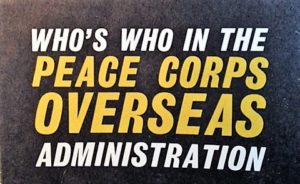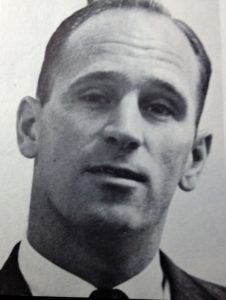Malawi’s First Peace Corps Staff
 The Malawi program, originally explored by Harris Wofford and later negotiated by Bob Hellawell in August 1962, eventually brought 112 Volunteers to the new nation, to teach in secondary schools and a teacher training institute. It also re-directed the services of scholar-athlete Robert Poole, who had originally been scheduled to go to Addis Ababa.
The Malawi program, originally explored by Harris Wofford and later negotiated by Bob Hellawell in August 1962, eventually brought 112 Volunteers to the new nation, to teach in secondary schools and a teacher training institute. It also re-directed the services of scholar-athlete Robert Poole, who had originally been scheduled to go to Addis Ababa.
Born in Wilmington, Del., and raised in Saylesville, R.I. and Litchfield, Conn., Poole attended Yale on a four-year Northwestern Connecticut Alumni Scholarship. He was middleweight boxing champion of Yale in 1953. He played basketball and baseball I the college intramural league. He participated in hockey and swimming and as a rugby player, participated in the Rug y Week tournaments in Bermuda for three years. (This was a result of the fact that spring football practice was banned when he was a sophomore—all the football players turned to rugby in the spring.)
Before he received his degree in history in 1954, Poole capped his athletic career at Yale with a remarkable performance as a football halfback. In 1952, for one example, when Yale was trailing Columbia by one touchdown with one minute to go, Pool caught a pass to tie the score. Yale kicked off, Columbia fumbled and two more passes to Poole put the ball on the 3-yard line, from where the Yale full back put it over on the next play.
After graduation, he satisfied his military duties by joining the Army, which commissioned him and sent him off to an artillery company in Hanau am Main, Germany, for 18 months.
In 1956, he joined the faculty of the Taft School in Watertown, Conn., as an instructor in history and head football coach in 1961; he became head baseball coach in addition.
A lover of camping and a wildlife hobbyist, he as given a study grant from Taft in 1960 which, combined with a writing assignment from Pan American World Airways, enabled him to pack up and head for Africa with his wife.
The two toured through Senegal, Liberia, Ghana, the two Congos, South Africa, Tanganyika, Kenya, Uganda and Ruanda-Urundi visiting the major parks and preserves—Kruger, Serengeti, Queen Elizabeth, Albert Park.
While bird-watching with binoculars on the banks of the Congo, he was mistaken for a spy and taken to the home of Patrice Lumumba where he was held until a United Nations official was able to get him freed.
When he returned to Taft School he introduced the first course on Africa to the school curriculum.
He saw the Peace Corps as an opportunity to return “and at the same time render a service to which I could give a deep personal commitment.”
He joined the staff on July 1, 1962, destined for Ethiopia and made a preliminary journey there on September 5, 1962, when he helped escort the largest single shipment of Volunteers to be sent overseas. [The Ethiopia One PCVs in Training at Georgetown University in the summer of 1962 had their first introduction to Poole one afternoon when a group of guys were sitting on the college’s Quad and Bob came walking across the lawn carrying a leather briefcase and when he reached the Trainees, he set the case down and opening it, pulled out a football and asked, “anyone want to play catch?”]
Poole had barely returned to Addis Ababa on September 28, 1962 when he was redirected to Blantyre. He was jointed there on March 4 by Deputy Representative Gordon Nelson.
Born in Scranton, N.D. Nelson managed to get in one year at Montana State College before the war caught up with him and found himself, in July, 1943, in the Marine Corps. He finished the war with the Marines and returned to Montana State where he graduated in 1958 with a degree in mathematics and journalism. He immediately took over as editor of the Lewistown (Mont.) Daily News, putting out newspapers six days a week, until March, 1950, when he moved to the Fresno bee as a reporter.
In 1958 he decided to go into business for himself and organized his own public relations firm devoted primarily to managing political campaigns. He would make the point when joining the Peace Corps that Malawi was as far away from home as he could get, with Blantyre only a few miles less than half way around the world from Fresno.
Associate Representative Wesley Leach, a recreation expert, arrived in Blantyre to join the Malawi staff on December 21, 1963. Born in Pocatello, Idaho, Leach finished high school in Gallup, N.M., in 1948. Over the next three years, while working part time, he managed to get two years of study at Idaho State College in Pocatello. He then took a job as an adjuster for Securities Acceptance Corporation, an automobile finance company in Albuquerque.
Two years later, he became collection manager for Realty Mortgage and Investment Company in the same city. In 1957, he was finally able to give his full attention to his major field of interest by becoming Supervisor of Sports for the City of Albuquerque Parks and Recreation Department. At the same time, he decided to finish his education, enrolled in the University of New Mexico in 1959 and obtained his degree in recreation two years later. He left his job with the city in 1961 for full time university work. While doing graduate studies, he served as a recreation instructor at the university.
Post Script:
In 1964, Bob Poole would become the Director of the Peace Corps’ African Programs, taking over from Franklin William who went to the United Nations. Later in 1970 Poole founder and then became the director (1972-1975) of the Smithsonian-Peace Corps Environmental Program. He would move onto become director of African operations for the African Wildlife Leadership Foundation and moved to Kenya. In 1977 he was cited for bravery by the Kenyan Government for his efforts to rescue passengers trapped in railway cars after a train plunged from a bridge into a river on a route between Mombasa and Nairobi. Then in May, 1978 tragedy struck. While driving to the Nairobi Airport, he was killed in an automobile accident. He was 45 years old.
Research Document: Who’s Who in the Peace Corps Overseas Administration (1963)
The photographs are by Rowland Scherman, Paul Conklin and Jim Walls, first photographers for the agency.
My memory may be failing me but I believe Bob Poole came to Somalia after one of our PC Directors was recalled and he filled in before another was assigned. It might have been in late 1967 or early 1968.
Marty Ganzglass
Odd: no mention in this peice of Pooles Kenya role…
Bob Poole was one of the last PC officials I saw before leaving Kenya; I was in his PC office in Nairobi minutes after he had sent Paul Theroux out the door.Both of us left our PC posts quite suddenly.
D.Day
Hello,
Stumbled on this while on “stay at home” in Massachusetts April 2020.
Of course I remember Bob Poole — he was the Peace Corps Director in Kenya when Peace Corps Kenya Nursing Education 1 arrived in December 1968. He was followed by another great director — Hank Raulerson.
There was a sense that we all were embarking on a great adventure assisted in our journey by Bb Poole’s leadership in Malawi. He was approachable and compassionate. We were shocked to learn of his passing. Such a terrible loss.